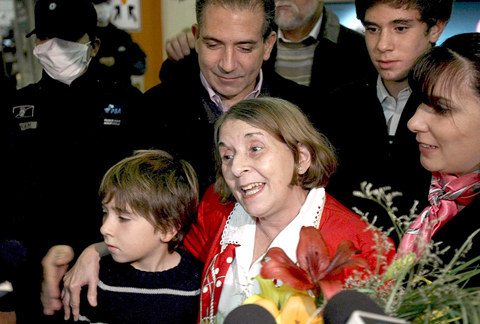A Cuban dissident surgeon said on Sunday that she harbors no grudge against former Cuban president Fidel Castro upon arriving in Argentina for an emotional family reunion after being denied permission to leave Cuba for more than a decade.
Desperate to see her ailing, 90-year-old mother, Hilda Molina said she wrote directly to Cuban leaders seeking permission to travel. On Sunday, she was able for the first time to hug her Argentine-born grandchildren, ages 13 and 8, and see her mother, who was allowed to leave Cuba months ago.
“I have inside a wound that will never heal,” Molina told reporters after meeting with her son for the first time in 15 years.

PHOTO: EPA
“I say to Mr Fidel Castro, who has been the scourge of my family, may he have all the peace in the world. May he choose the path that the country needs. I don’t need to forgive him for anything,” she said.
Cubans like Molina who dare to openly criticize Cuba’s system are often denied permission to leave the country. Cuba also restricts individual foreign travel by its physicians, saying it spends too much training them to allow them to emigrate for higher salaries elsewhere.
The surprise travel authorization, issued on Friday, was seen as a gesture of openness in the era after Fidel Castro ceded power to his brother, President Raul Castro, in 2006 for health reasons. It was also seen as a nod to Argentine President Cristina Fernandez, a Cuba ally who along with her husband and predecessor, Nestor Kirchner, had asked the Castros since 2003 to allow Molina to leave.
But Molina said her approval to travel in itself did not indicate broader changes by the Cuban government.
“That will be resolved when we Cubans do not have to ask permission to enter and leave the country,” she said. “There are 11 million Cubans whose rights are being violated.”
Molina, who once posed for high-profile photos with Fidel Castro, was a well-known physician at a government institution until 1994, when she resigned after questioning the ethics of using human stem cell tissue in studies on treating ailments like Parkinson’s disease. That same year her son left Cuba with his Argentine wife.
Molina’s travel documents are good for several months. She said she intends to return to Cuba, but not while her mother is in precarious health.
“I put it in the letter to Raul Castro ... that when I close the eyes of my mother I will return,” Molina said. “I want her to recover and to return together. But as long as she is in danger I am not going to abandon her.”

Former Nicaraguan president Violeta Chamorro, who brought peace to Nicaragua after years of war and was the first woman elected president in the Americas, died on Saturday at the age of 95, her family said. Chamorro, who ruled the poor Central American country from 1990 to 1997, “died in peace, surrounded by the affection and love of her children,” said a statement issued by her four children. As president, Chamorro ended a civil war that had raged for much of the 1980s as US-backed rebels known as the “Contras” fought the leftist Sandinista government. That conflict made Nicaragua one of

BOMBARDMENT: Moscow sent more than 440 drones and 32 missiles, Volodymyr Zelenskiy said, in ‘one of the most terrifying strikes’ on the capital in recent months A nighttime Russian missile and drone bombardment of Ukraine killed at least 15 people and injured 116 while they slept in their homes, local officials said yesterday, with the main barrage centering on the capital, Kyiv. Kyiv City Military Administration head Tymur Tkachenko said 14 people were killed and 99 were injured as explosions echoed across the city for hours during the night. The bombardment demolished a nine-story residential building, destroying dozens of apartments. Emergency workers were at the scene to rescue people from under the rubble. Russia flung more than 440 drones and 32 missiles at Ukraine, Ukrainian President Volodymyr Zelenskiy

COMPETITION: The US and Russia make up about 90 percent of the world stockpile and are adding new versions, while China’s nuclear force is steadily rising, SIPRI said Most of the world’s nuclear-armed states continued to modernize their arsenals last year, setting the stage for a new nuclear arms race, the Stockholm International Peace Research Institute (SIPRI) said yesterday. Nuclear powers including the US and Russia — which account for about 90 percent of the world’s stockpile — had spent time last year “upgrading existing weapons and adding newer versions,” researchers said. Since the end of the Cold War, old warheads have generally been dismantled quicker than new ones have been deployed, resulting in a decrease in the overall number of warheads. However, SIPRI said that the trend was likely

‘SHORTSIGHTED’: Using aid as leverage is punitive, would not be regarded well among Pacific Island nations and would further open the door for China, an academic said New Zealand has suspended millions of dollars in budget funding to the Cook Islands, it said yesterday, as the relationship between the two constitutionally linked countries continues to deteriorate amid the island group’s deepening ties with China. A spokesperson for New Zealand Minister of Foreign Affairs Winston Peters said in a statement that New Zealand early this month decided to suspend payment of NZ$18.2 million (US$11 million) in core sector support funding for this year and next year as it “relies on a high trust bilateral relationship.” New Zealand and Australia have become increasingly cautious about China’s growing presence in the Pacific